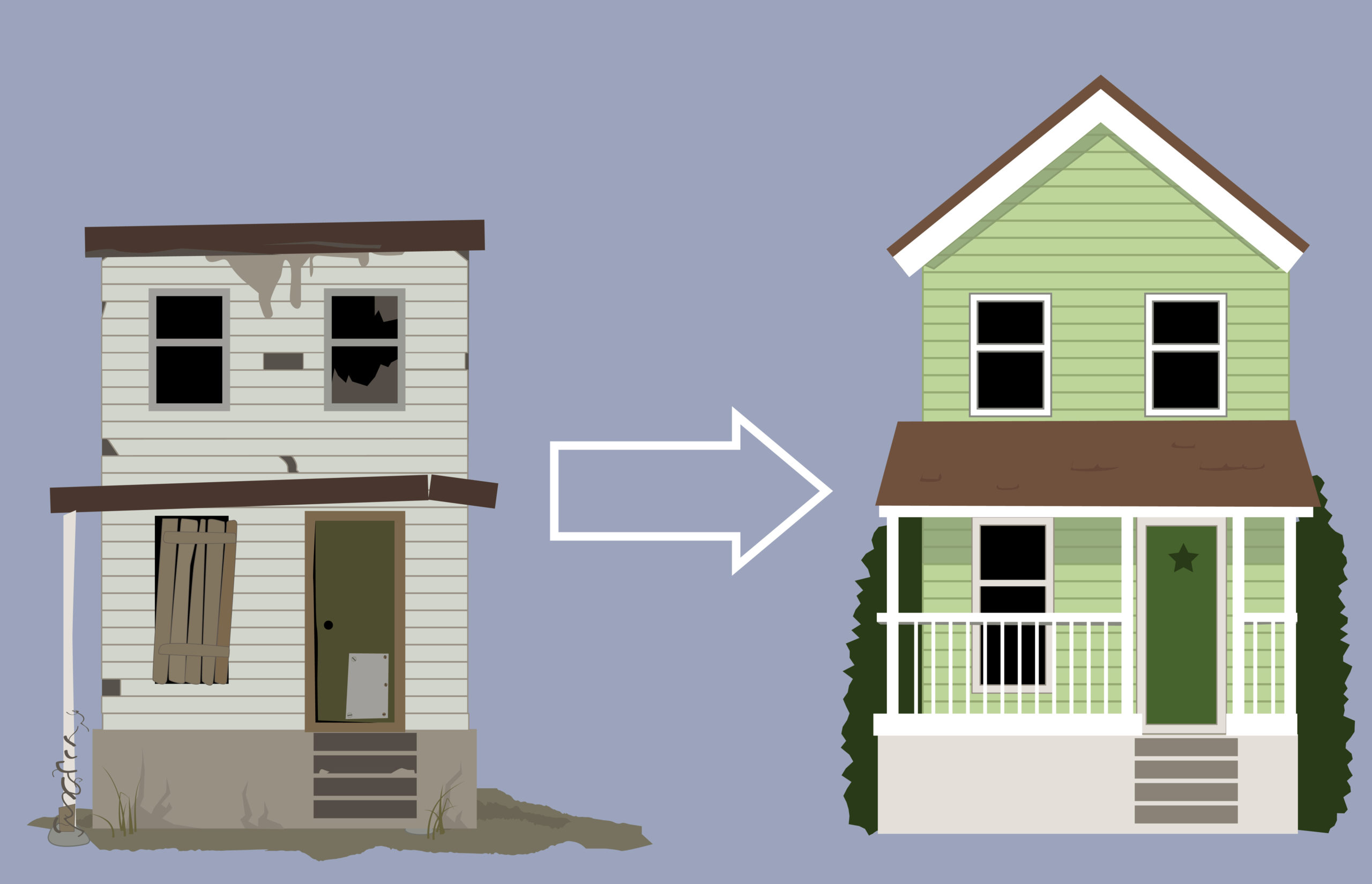
20 Feb How Well Should I Renovate a House When Flipping It?
I believe you should always leave a property better than the way you found it. When fixing and flipping a house, you have a golden opportunity to do that and make a profit. The key is to make a profit, and not every flipper does that!
I have seen so many amateur flippers over-improve their house. I have also seen some novice and some experienced flippers under-improve their house.
Yes, it is your house so you can do with it as you please. You can put lipstick on a pig and throw a For Sale sign in the front yard. However, there are optimum strategies that will help you maximize your sale price and minimize your days on market. You want a Wow! factor to impress potential buyers while keeping costs under control. You also want to offer a product that doesn’t make buyers go, “Oh, they seemed to cut a lot of corners here.”
Below are some principles to guide you on your fix-and-flip projects.
- Create a budget that’s designed to produce a profit. Do not deviate from that budget. This is about being a good businessperson. I knew a novice flipper who was so excited about their house that they hired a foreman at $1,000 a week just to watch the contractors that the flipper had already hired. The foreman wasn’t there to do any work; he was there just to observe! Then the foreman told the flipper that he needed to make a mutual associate a 50-50 partner on the deal. The flipper wanted to share this exciting experience with their friends, so he allowed a partner to own half the house. The partner was not expected to do any renovation work. He was merely supposed to contribute money. In theory, this meant that the flipper would not have to borrow as much money (and of course, it meant that his potential take-home profit was now cut in half!). It turned out the partner didn’t have liquidity and would take weeks to contribute his share of the money, so the flipper had to borrow money until his partner contributed his share of the funds. What good is a money partner if he doesn’t really have the money?! The novice flipper was warned that his planned list price was much higher than the comparable sales in the area. Instead of listing the house at a fair market value price that would attract buyers, he put the house on the market at a price that would produce a $15,000 profit. After months of being on the market, the flipper and his partner sold the house at a slight loss. The flipper said he learned that in cases like this, he didn’t need a foreman, didn’t need a partner, and didn’t need to overprice the house.
- Have fun with the renovation but don’t fall so in love with the project that you over-improve the house. I knew a couple who bought a house to fix and sell, and they spared no expense. They loved going to the hardware stores and making the rooms look like photos in designer magazines. They improved the house so much that they spent more on it than what it could sell for! They assumed that every dollar they spent would produce at least two dollars when the house sold. After having it listed on the market at too high a price for months, they reluctantly chose to move in and sell their current residence.
- The renovations should be designed to appeal to typical buyers in the marketplace. There shouldn’t be unusual colors, wild design features, or substandard materials. Wall colors should be neutral. Light gray or off-white are in. White kitchen cabinets are in. Oil-rubbed bronze or brushed nickel fixtures and accents are in. You don’t need multiple accent walls (or any), nor do you need overly elegant light fixtures and shower nozzles. Unless you’re involved in an ultra-luxury house flip, you don’t need high end floors, name-brand windows, or prestigious chandeliers.
- The quality of the finishes should be equivalent or only slightly better than what is typical for the neighborhood. If other homes in the area and in the same price range have carpet or luxury vinyl plank floors, then you don’t need imported Italian marble for your floors. Carpet or LVP will do. If comparable homes have granite or quartz countertops, then don’t install laminate or butcher block countertops. The bottom line is that you don’t want to have a house that is over-the-top compared to the other properties. You also don’t want a dud. I’ve seen flip projects with burned-out or missing light bulbs, missing base moulding, unpainted trim, ancient light fixtures, and old locksets and doorknobs.
- Permits should be pulled and inspections should be completed. If you’re flipping a house, anticipate that the buyer and their agent will check to see if you pulled the proper permits. They want to know that they’re buying a house with work performed to code. I know flippers who deliberately didn’t pull permits, and then they hoped that no one would notice. You don’t want to put yourself in that situation. It could jeopardize your sale and create increased liability for you. Imagine if the electrical work was shoddy and caught on fire after the buyer moved in – that would be bad for everyone. Ensure that the proper permits are pulled. Ensure that you do what is necessary to have the city or county inspector give you a passing grade. Your renovation plan should include getting the house up to code.
The purpose of business is profit. The reasons why you engage in real estate investment can range from pride of ownership to altruism to excitement to a love of interior design. Your life’s purpose – why you do what you do – is a wonderful thing. That being said, the purpose of business is profit. Your activities on your flip project must be designed to produce a profit. Beginning with the end in mind, you will be far more likely to achieve that outcome.
Let me know how your flip project is going!
Tai DeSa is a graduate of The Wharton School of the University of Pennsylvania. He became a full-time real estate investor in 2004 after serving in the U.S. Navy. Tai made colossal mistakes in investing (and learned some things along the way). He has helped hundreds of homeowners avoid foreclosure through successful short sales. Check out Tai’s books on Amazon.com. Tai may be available for coaching and speaking engagements on a variety of real estate topics. Send an email to tai@investandtransform.com.






Kelli D
Posted at 01:52h, 21 FebruaryI continue to enjoy your posts!
Tai Desa
Posted at 00:56h, 24 FebruaryThank you Kelli for reading my articles!